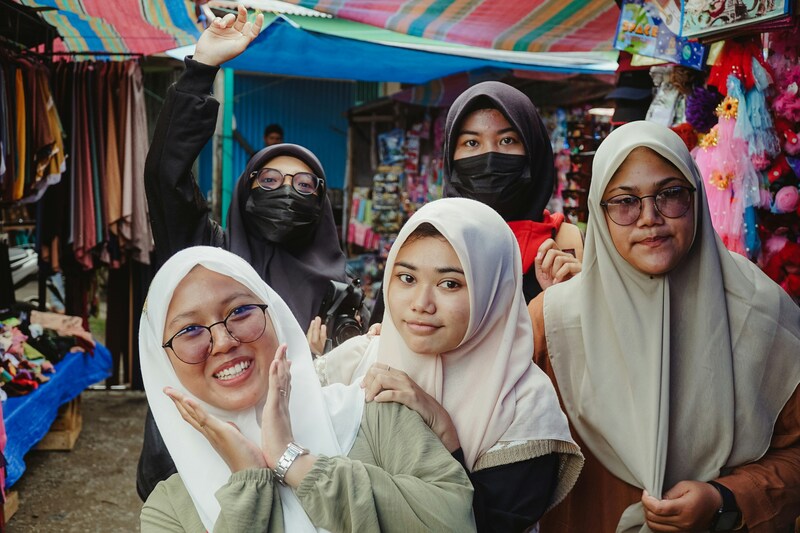Visitors, foreign nationals, and even native Indonesians may have already had their ears ‘bashed’ – as the Australians would say – by friends and well-wishers alerting them of fearful religious oppression in Aceh a.k.a. the ‘Veranda of Mecca’ – a place only few outsiders have actually visited.
Some experts in Java told us, before we visited Aceh, that we would not be able to sleep in the same hotel room or sit together in the back seat of taxis unless we could prove we had been joined in the sight of a Deity — though, in our case, that would be a civil registrar. My Indonesian Protestant wife, Polin, was advised to wear a jilbab (headscarf) in public and never behave in any way suggesting affection. The strict Sharia laws that apply nowhere else in the nation were upheld by morality police and could lead to public floggings for miscreants.
To put it briefly, Aceh has recurringly been painted by some people as an Indonesian version of theocratic Iran, which is not exactly the sort of image to encourage overseas investors and certainly not holidaymakers. Westerners are rare in Aceh and are mainly drawn by the surfing spots in the northern part of the province. No alcoholic drinks are allowed, either. Most tourists are usually from Malaysia; there are direct 90-minute flights from and to Kuala Lumpur, to boot.
As the warnings came from professionals and even senior staff from an international agency who had previously made many visits to Aceh, we decided to treat their advice seriously. We photocopied our marriage certificate and Kartu Keluarga (family residence card) and reluctantly bought a headscarf.
Our anxieties were reinforced once we arrived at the Sultan Iskandar Muda International Airport. In Jakarta, air hostesses were bare-headed, displaying splendid coiffures and trim figures. Here in the capital city of Aceh, Banda Aceh, the hostesses’ heads, shoulders, and chests were covered, making them appear shapeless and almost unrecognisable. In the airport arrival lounge, every woman covered their face and hands — except my beloved wife who wanted to preserve her religious identity without causing any strife. She drew glances more than stares from the locals, more likely driven by the sight of a cross-cultural couple than the outfit my wife was wearing.

We sat together in the back seat of the cab without the driver demanding legal proof of betrothal. Instead, he volunteered that our stay would be peaceful and safe, and spent the 40-minute drive to Banda Aceh emphasising his point that a headscarf was unnecessary to wear by non-Muslim women. The unsought assurance was repeated at every contact. At the hotel where we stayed, no marital documents were needed to be shown, either.
In the supermarket where we stopped by, we saw a white-skinned mum wearing a headscarf which caused us a brief worry. However, at the next check-out, a bareheaded local assured us that there would be no issue whatsoever because the practices of other faiths were respected and, as a Christian herself, she had never copped abuse. Moreover, the small Chinese population in Aceh follows Buddhism and Christianity. On top of that, there is a prominent Catholic church in the centre of the city.
The locals joked with us that Aceh stands for “Arabic, Christian, Europa and Hindi (India)“.
We frequented kampong eateries and were never refused service. We held hands when crossing roads — not to irk anyone; we simply wanted to cross the roads safely. Annoyances, turned out, were minor. Banda Aceh had more places to pray than stay, we also discovered. Public attractions, such as the spectacular and moving Tsunami Museum, would close from 11.30 AM to 2 PM so that the Muslims could conduct their afternoon worship. The public signs, we observed, were bilingual. The second tongue here is not English as in Java and Bali; instead, it is Arabic.
It did not escape our attention that this December will mark two decades after the devastating Indian Ocean earthquake which was then followed by the world’s most powerful recorded tsunami that took 228,000 lives – the majority of whom were the citizens of Aceh. Out of the city, a flat grassed area with a single-wave memorial marked the mass grave of 46,718 unknown victims, their bodies too damaged to be identified. The survivors would regularly recall the horrors to help visitors understand the size of the tragedy. They were also keen to thank foreign countries for their help in rebuilding the city.
Human rights activist Farida Haryani was running a non-governmental organisation called Pengembangan Aktivitas Sosial Ekonomi Masyarakat (PASKA) Aceh that also helps the disabled who are the survivors of the tsunami. “I tell our 20 staff that we must accept God’s will,” Haryani said. “That doesn’t mean we cannot ease their plight through re-education, medical care, and equipment like wheelchairs to help them live [worthwhile] lives.”
The headquarters of the organisation is situated in Sigli; the building was donated by Canadian agencies. There were two camps near the headquarters, holding hundreds of ethnic Rohingya asylum seekers who fled Bangladesh after being forced out of the Myanmar homeland by a ruthless military junta. Despite stories of hostility towards the refugees, PASKA Aceh nonetheless made available a teacher to help these asylum seekers communicate; most of whom were monolingual and poorly educated.
Maybe we were lucky and only met helpful moderates during our visit, but none of our bleak predictions came to pass. In fact, we discovered that the people of Aceh were friendlier than those in East Java.
Should readers consider visiting Aceh as well? That should be a personal decision. Having said that, it should be noted that the roads there were relatively uncrowded and the traffic was generally smooth. The landscape was also enchanting and the climate was relatively tolerable. There were no ‘morning price’ touts, either.
There is much to see and admire in Aceh. Polin’s headscarf is for sale now; it has never been used. Turns out, Aceh is not Iran.
